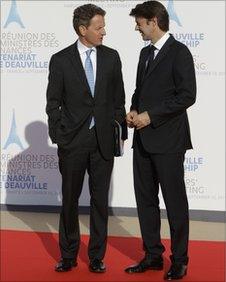Americans wade in on Euro crisis
- Published
- comments

The US is sounding its own alarm about the Euro crisis
You might think President Obama has enough on his plate without worrying about the European crisis. But you'd be wrong.
The White House may not really care too much about the fate of the euro itself, but it does care about European banks and the sense of impending economic doom.
Any blowback - a Lehman Brothers in reverse - could send the fragile to non-existent US recovery spinning right off course.
So President Obama and his treasury secretary have rolled their sleeves up, and got stuck in to the most inflammatory debate in Europe.
Should the crisis mean more Europe, or less?
"It is difficult to co-ordinate and agree on a common path when you have so many countries with different policies and economic situations," Mr Obama told a number of Spanish-speaking journalists.
That is a truism in Europe to anybody who has dealt with, observed or covered the multi-headed EU beast.
The relationship between the governments of 27 countries, the European Commission and the European Parliament is less fractious than the relationship between Congress and the president.
But even America's tortuously slow decision-making process looks like lightning by comparison. There are very good reasons for this. But the president suggested a way has to be found around it.
"In the end the big countries in Europe, the leaders in Europe must meet and take a decision on how to co-ordinate monetary integration with more effective co-ordinated fiscal policy," Mr Obama said.
The Obama administration has felt for a while that European leaders have used sticking plasters instead of drastic surgery, that they come up with bland statements to half-soothe the markets and head off a crisis for a few weeks at a time, only for it to be back the following month.
Now they've gone public because private frustration has turned to genuine alarm.
The message that there has to be bold, dramatic action will be delivered in person by none other than US Treasury Secretary Timothy Geithner.
He is making an unprecedented trip to join European finance ministers in Poland.
Mr Geithner's analysis will be unprecedented as well in its bluntness. He says Europe has been behind the curve, and has to show that its leaders have finally got the message.
"They're going to have to demonstrate to the world they have enough political will. This is not a question of financial or economic capacity," Mr Geithner said.
"Even if you take a very conservative, pessimistic estimate of the ultimate cost of resolving this crisis for Europe, it is completely within the capacity of the stronger members of the euro area to absorb those costs."
What is interesting here is that US leaders are missing the ideological nuance, and making - what to them - are pragmatic arguments.
They don't really care about the plight of European leaders at the mercy of an economic crisis that demands one thing: great integration - but could prompt a political crisis demanding the exact opposite: a looser Europe.
However, because Americans are unconcerned about the ideological nuances of the debate, perhaps they see things a lot more clearly.
Wall Street has much the same view as the White House. It is the crisis that worries them, not the fate of the euro itself, or the exact mechanisms taken to solve it.
David Zervos from Jefferies Global Securities says many Americans regard the Euro with distaste.
"The structure of economic and monetary union has been left half-built," Mr Zervos told me.
"We are in the middle of one of the worst recessions that any of us have ever lived through, and the euro structure was not built for that sort of turmoil.
"Fiscal union, the ability to pull resources fiscally across countries, was not built into the structure and right now we are seeing that problem tear the system apart and it's a pretty messy situation."
He points out that the US went though a debate about federalism 200 years ago, while Europe has had a federal currency for just over 10 years, but seems unenthusiastic to have the same debate.
Behind the intimidating talk of "fiscal integration", what do the Americans mean?
They would like Euro bonds, certainly, but may have accepted that is not going to happen. So they would like stronger action by the European Central Bank, with the will of the Fed to act quickly and strongly.
They want European politicians to put their people's money where the elites' mouths have been for a long while.
At first blush, it is faintly amusing that this harsh, practical advice is coming from the USA.
Here, political pragmatism often goes by the board as every idea gets tested against philosophic first principles.
America's leaders seem to ignore the problem at the heart of this debate: to survive, the euro may need a spirit of European solidarity that simply doesn't seem to exist.
But then if the idea of the Euro had been destruction-tested, American-style, against political first principles, Europe's leaders might not be in need of a lecture from the president.
- Published8 August 2011